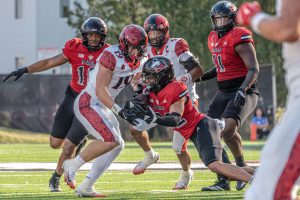Alcohol arrests spike
September 15, 2004
Alcohol arrests at colleges nationwide went up for the 11th straight year in 2002, according to a 2004 study done by the Chronicle of Higher Education.
The study reported a 10.6 percent increase in arrests, with the University of Madison-Wisconsin topping the list with 837 arrests. The figures are based on data reported by 6,327 two-year and four-year colleges eligible for federal aid.
Alcohol and drug-related traffic arrests in DeKalb also rose from 224 in 2002 to 315 in 2003, according to an annual report from the DeKalb Police Department.
The most common site for alcohol-related arrests is in the northwest section of town near Greek Row, DeKalb Police Chief Bill Feithen said.
While police do have alcohol-related problems with Greek organizations from time to time, it would be unfair to place the blame squarely on them, Feithen said. Parties at student apartments in the area can also present major trouble, he said, especially when partygoers number in the hundreds.
Several factors can be attributed to the rise in arrests, particularly a clash between an increasing tolerance of underage drinking by students’ families and hometowns and more recent aggressive law enforcement policies, said NIU Judicial Director Larry Bolles.
“High school students are openly drinking today,” Bolles said. “When they leave for college, they don’t leave that beer at home.”
However, the past three years have seen growing efforts by NIU and DeKalb police to enforce drinking laws, Bolles said, and students expecting lax treatment are often left holding a drinking citation instead.
“The pendulum’s swung, and students happened to miss it,” he said.
Certain events can also cause a jump in statistics, such as the police sweep at the start of the fall semester that netted over 200 arrests and citations, Bolles said.
Besides citations or DUIs, alcohol abuse can often lead to a myriad of other problems for college students.
A disproportionate amount of students referred to NIU’s Judicial Office have problems stemming from excessive drinking, cheating, fighting and sexual assault, Bolles said.
According to Bolles, the number of alcohol-related police reports referred to the Judicial Office has tripled over the past three years.
Drinking on campus hasn’t been an area of elevated concern, but it continues to be an issue, said University Police Lt. Matt Kiederlen.
The number of DUIs at NIU has dropped, Kiederlen said, a fact largely attributable to growing student awareness and an increased use of NIU’s Late Night Ride Service.
University Police focus on preventative measures such as educational programs, stationing officers in residence halls and an increased use of NIU’s judicial office; they usually only arrest a student as a last resort, such as in the case of repeat offenders or unruly behavior, Kiederlen said.
Health Enhancement Services is implementing a plan to send students a card with tips about safe drinking on their 21st birthday, said Amy Franklin, a health educator for NIU Health Enhancement Services. NIU also has a contract with mystudentbody.com, a Web site students cited for drinking can visit to fulfill their sanctions.
Students visiting the site can ask experts about drinking, learn about the effects of alcohol on the body and use a blood alcohol content calculator to find out how drinks will affect them.






